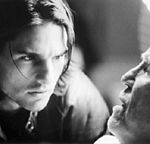REDEFINE EPIC. Lose the chariot races and parting seas. Forget about The Green Mile entirely. With so many prestige pictures verging on three hours, Paul Thomas Anderson has produced a rambling, ambitious panorama of modern life that almost justifies its length and complexity. He does so by turning inward, to the family—or families, several of them, in various stages of disarray and dysfunction.
MAGNOLIA
written and directed by Paul Thomas Anderson
with Tom Cruise, Philip Seymour Hoffman, William H. Macy, Julianne Moore, and Jason Robards
opens January 7 at Metro, Pacific Place
It’s not immediately clear who’s related to whom—or how—as we rapidly survey the myriad SoCal characters in Anderson’s ensemble cast. But they are related, both by blood and need. “I really do have love to give,” despairs a former child quiz show star (William H. Macy). “I just don’t know where to put it.” He’s not the only one. We also meet a dying old man (Jason Robards), his self-hating wife (Julianne Moore), and the nurse (Philip Seymour Hoffman) tending to him. Boogie Nights‘ Hoffman is the moral center of Magnolia as he guides this fractured family towards reconciliation.
First, however, family history must be addressed. Robards’ character’s estranged son turns out to be a buff, preening, self-made infomercial god who leads misogynist “Seduce and Destroy” seminars. Tom Cruise is startlingly good in this role, his hyperactive smirk masking deep unease. “The past has its place,” he says, rebuffing a skeptical TV reporter. A more fatalistic view comes from a cancer-stricken game show host (Philip Baker Hall, another Anderson vet), who opines, “The past ain’t through with us yet.” His angry drug addict daughter runs into a cop (John C. Reilly), but he turns out to be a softie. “We should try and do good,” he says in his empty squad car. (Other characters and episodes would fill a telephone book, and will have to go unmentioned.)
In his relentless scrutiny of human frailty, Anderson resembles Todd Solondz (Happiness) and Neil LaBute (Your Friends and Neighbors), but he’s more of an optimist, refusing to condemn all his characters to an inferno of pathological irony. Granted, he belabors his themes of atonement and forgiveness with unnecessary subplots and characters, and his rapid cutting between them is often more annoying than suspenseful. (He needs to learn that reiterating one’s ideas doesn’t make them more profound.) Magnolia is also a musical of sorts, as Aimee Mann songs swell too prominently to the foreground.
Yes, Anderson’s film is self-indulgent and excessive, but also wise and compassionate. And in the end, as the California weather turns genuinely weird, Magnolia achieves a ragged spiritual kinship with certain epics of the ’50s—or at least the Good Book they’re based on.








